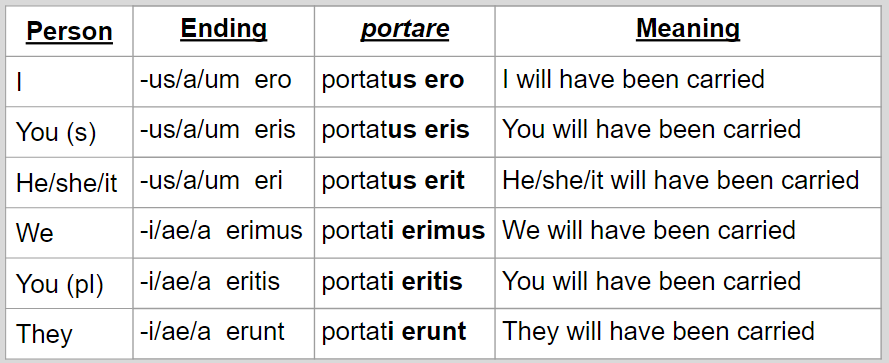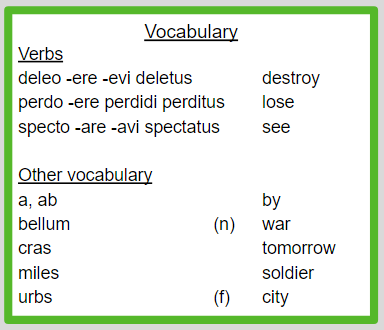Future Perfect Passives: You Will Have Been Educated
January Latin Challenge: Day 31 of 31
This is it. The final day. You’ve made it!
For our last January Latin Challenge post we are going to be talking about future perfect passive verbs in Latin.
Now you might be thinking, “oh great, another future tense. Are you joking?” Which, you know, is understandable. However, the future perfect is really useful. It's not used very often, but it's always good to be able to recognise it.
If you're struggling with any of the passive verb endings we have covered in the past few days, download my Complete Reference Guide to Latin Verbs. It's got all the tables you need and it's completely free. It'll be real useful just to have to hand.
Active or Passive?
In the active voice, the nominative is the one doing the verb.
The boy will have kicked the horse.
In a passive, the nominative is having the verb done to it.
The boy will have been kicked by the horse.
In the first sentence the boy is doing the action. In the second sentence, the boy is receiving the action, but he is still grammatically nominative, his role has just changed.
How to spot them
Future Perfect Passives in Latin are formed using the perfect passive participle, which is the fourth principle part in your dictionary lists next to all your verbs. It uses the future tense of the verb esse, which means “to be”.
In future passive verbs, the perfect passive participle is always nominative luckily, because it has to match the person in charge of the sentence, the nominative. However, it changes gender and number to match that nominative. This is just like the perfect passive verbs and the pluperfect passive verbs. Both those posts are in the bambasbat archive, if you want to go and have a little look at those.
What do you mean, the endings change for gender and number?
For Singulars:
-us for a masculine noun
-a for a feminine noun
-um for a neuter noun
To those, I add ero, eris, or erit, depending on whether it's I, you, or he/she/it as the nominative.
For Plurals:
The ending of the PPP changes to plual make it match the nominative.
-i for masculine
-ae for feminine
-a for neuter.
Then erimus, eritis, or erunt is added as a separate word on the end.
Here's an example
I've given you the masculine form of each for porto
Practice Sentences
Here are 3 sentences. Have a go at them, and read on when you are ready for the explanations. There’s a vocabulary list in the green box. You might notice that the verb entries are longer than usual. That's because I have given you all four principle parts of the verbs. The fourth principle part is what we're looking at today, the perfect passive participle.
a militibus spectata eris.
cras bellum perditum erit.
urbes deletae erunt.
Read on when ready
a militibus spectata eris.
spectata eris is my verb. It's a future perfect passive. I know that because I have the future form of the verb “to be” plus a perfect passive participle. So spectata eris, “you will have been seen”, a militibus, “by the soldiers”.
cras bellum perditum erit.
My verb perditum erit, again a future perfect passive. This time it is a neuter form of he, she, it will have been. So I know that it's “it will have been lost”.
cras gives me some time context to this sentence, “tomorrow”.
Then bellum is my nominative.
“Tomorrow the war will have been lost.” It's not a very happy sentence.
None of my sentences are very happy. Sorry about that.
urbes deletae erunt.
Verb first: deletae erunt. This is 3rd person plural and it's feminine. So I need to find a feminine noun. urbes is actually feminine and that's why I've shown you in the vocabulary what gender the noun is. So urbes is my nominative.
“The cities will have been destroyed.”
And that's really all there is to future perfect passives. They can look quite daunting when you first see them, especially if you don't really know your esse in the future tense, which is something that you should get on learning if you can. If you have forgotten any of the verb “to be”, you can re-read Day 16: To Be or Not To Be here.
But if you stick with future perfect passives, they actually make quite a lot of sense. They follow the same pattern as the perfect and pluperfect passive verbs with the perfect passive participle, and then a version of the verb to be added on.
The most important thing to remember is that it has to match the nominative in number and gender, but they're always going to be nominative so luckily there's only a few endings to learn for these. You just need to remember the future tense of the verb “to be” gets added onto the end of the perfect passive participle, that fourth principle part.
And that’s the end of the January Latin Challenge! Well done! You did it! I’m super proud of you! Let me know if you have any questions or queries or anything that you struggled with in the comments. What was your favourite day?
Don’t worry though, this 31 day challenge was just the start of the journey for bambasbat, and I’ll be back next week with a new post. Make sure you subscribe to get it sent straight to your inbox, and I’ll see you then!



